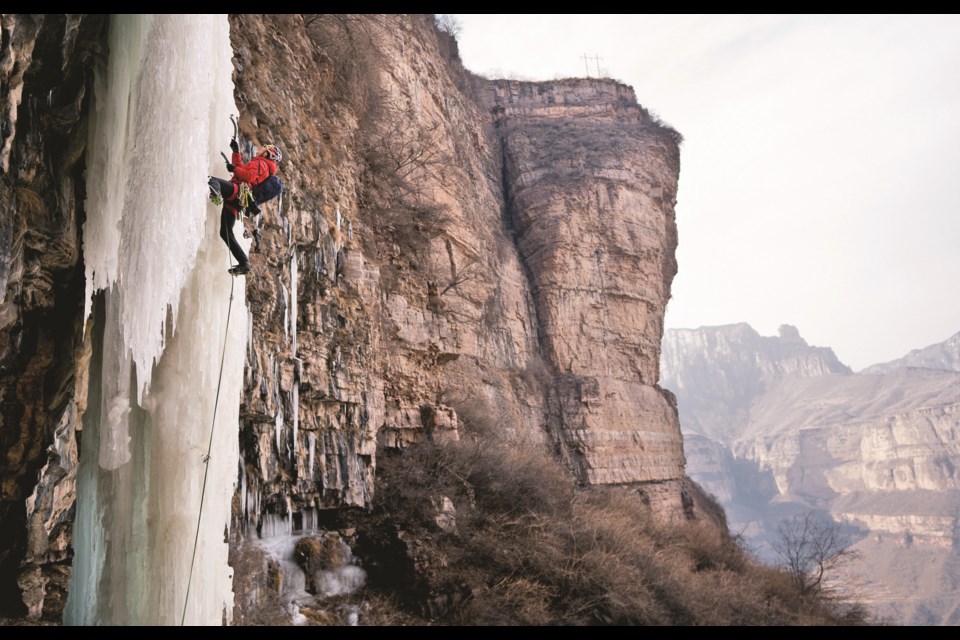A new film following Red Bull athlete and Canmore resident Will Gadd as he seeks out new climbing routes in remote regions of China was a darling of the 2020 Banff Mountain Film Festival, which wrapped up Nov. 8.
The 40-minute documentary features the charismatic Gadd in his element as he on-sights vertical pillars of ice in a country known more for its government’s extreme surveillance measures than its extreme sports.
Shot while political relations between Canada and China were tense, Will Power ultimately portrays the redeeming power of human-to-human connections, while also showcasing the athletic abilities of one of the world’s most talented ice climbers in some of the wildest canyons on earth.
And while the film’s director, former resident of Jasper and Canmore – Calixte Leblanc – has been aglow in the BMFF spotlight and thrilled to have had the opportunity to work with one of his climbing heroes, when he reflects on his own perilous journey of the past 15 years, the 60-metre delaminating ice pillars Gadd was scaling seem positively steadfast in comparison.
“I made a series of bad choices, back to back to back,” Leblanc said.
As a person recovering from the disease of drug addiction, Leblanc is grateful to be alive. Jasper residents might remember in 2007 when he and fellow “dirtbag,” Alain Denis, rode their motorcycles out of town, the freedom of the open road beckoning them on a six-continent climbing adventure. What most locals didn’t know at the time was that Leblanc, a longtime Jasper waiter and taxi-driver, was trying to escape a crippling cocaine addiction.
“I didn’t know what to do,” he said. “Alain said ‘let’s leave the country.’ ”
Their 15-month trip was, by all accounts, extraordinary, but Leblanc was never able to fully outrun his demons, alternately being lifted from his despair as he chased his dream of filmmaking before eventually being dragged back into the dangerous lifestyle. And lucrative as it was, he knew he had to get out of the restaurant industry.
“I wanted to go to film school,” he said.
But at upwards of $100,000 for a college degree in film, that route was out-of-reach for Leblanc. Instead, he settled on a business administration diploma, going back to his home province of New Brunswick to obtain it.
While there, he entered a competition to become a TransCanada Trail-roving videographer and although he didn’t win the contest, he did negotiate himself into an outdoor adventure correspondent job for the CBC, something that shouldn’t surprise the dinner guests he wheedled tips out of for all those years, nor the executive producers he would eventually coax money out of to front his film.
“They went for it,” he laughed.
So did Leblanc. He had a real job and, more importantly, renewed drive. He saved enough money to leave the Maritimes, reuniting with Denis in Montreal and freelancing for different film projects before landing a somewhat steady gig with the Wild Television Network in Edmonton. His assignments involved getting dropped in the middle of the woods, filming hunters in pursuit of big game. At first it was riveting, but then it felt exploitative, he said.
“I was honestly conflicted with that stuff, but I wanted to grow as a filmmaker.”
He grew. The run-and-gun style of filming for Wild TV gave him the necessary experience to pull off Will Power, where he assumed not only the director role but additional production duties after some of his team members felt uneasy about travelling to state-run China.
And while the shoot was logistically frantic – Leblanc and his fellow cameramen had to quickly figure out the best angles from which to film as Gadd front-pointed his way up “one of the best pitches of [his] life” – in the end, their paranoia about government interference was unfounded.
Although things got awkward when a Chinese rescue team mistook Gadd’s rock route exploration for a distress signal, tensions eventually eased and the film crew was soon celebrating Chinese New Year with their “rescuers” over homemade dumplings and baijiu.
“It was an experience of a lifetime,” Leblanc said.
Today, along with putting in steady shifts creating digital content for a Vancouver-based architectural hardware company, Leblanc is creating another lifetime project, one that tells, in part, his own story of recovery.
Portraying the self-healing journeys of athletes whose extreme pursuits often belie their grief-stricken battles with mental health issues and addiction, Breaking Free will help bring awareness to issues that Leblanc himself deals with.
Through daily Vipassana meditation practice and regular Narcotics Anonymous meetings, Leblanc is able to live a life of focus and self-care, but he still needs regular reminders of how far he’s fallen and how hard he’s worked to get to where he is today. Making Breaking Free is all part of staying that path, he said.
“I ended up not being able to make rent and sleeping in a friend’s store for six weeks,” he recalled. “I was so desperate.”
Although that’s not to say he would change his journey. For had he not hit rock bottom, Leblanc wouldn’t have discovered the meditation practice that is now giving him the clarity and the strength to reach for the sky.
“I truly believe if it wasn’t for addiction I wouldn’t have found Vipassana,” he says. “And Vipassana’s going to be that secret weapon, that tool for me to obtain the life I truly want.”
He’s already seeing results. Will Power was his first film. Despite the many lives he’s lived and the experiences he’s accrued, Leblanc is only getting started.
Bob Covey is the editor and publisher of the Jasper Local – [email protected]




